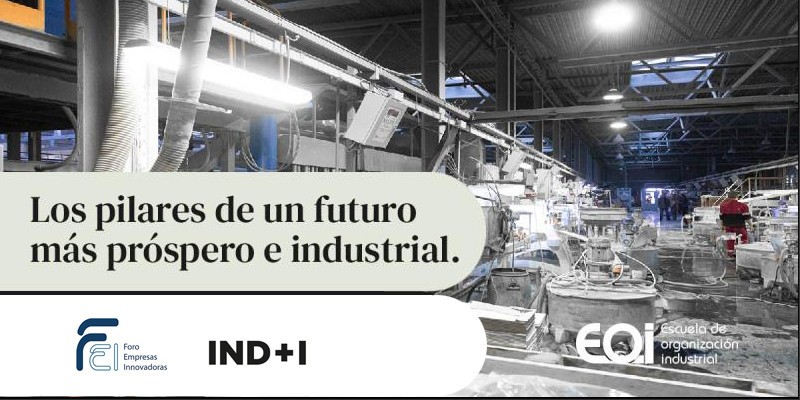The Escuela de Organización Industrial presents “The pillars of a more prosperous and industrial future"

The Global Economics Observatory (Observatorio de Economía Global) of the Escuela de Organización Industrial has been holding a series of webinars and lectures under the title “El Día Después” (The Day Afterwards), centering on the analysis and study of the world’s new post- COVID-19 scenario. As part of this series the Forum of Innovating Firms (Foro de Empresas Innovadoras) and IND+I Science have presented the manifesto “Los Pilares de un futuro más próspero y sostenible” (The pillars of a more prosperous and sustainable future). The document, jointly drawn up by both organizations, includes a series of “recipes” for galvanizing the post-COVID-19 economy, including a firm commitment to a productive model based on innovation, science and industry.
The Foro de Empresas Innovadoras was represented by Luis Fernando Álvarez-Gascón, general manager of GMV’s Secure e-Solutions sector and FEI president, with IND+I represented by its scientific president, Xavier Ferràs. Between them they spelled out the manifesto’s main ideas, such as a structural shift in the model (more digital and eco-friendly), industrial transformation (greater specialization and more resilience), vertical and horizontal integration of innovation, the importance of public investment in the fiscal expansion, the speeding up of European integration and SDG-based global market positioning.
As FEI’s president explained, Spain has to build up its own industrial capacity because “industry is a vector for achieving stable, better paid and more productive employment. It also has a huge knock-on effect on other sectors and big exporting potential too, as well as making our whole economy more resilient and secure”.
The manifesto proposes a reinvention of industry under the guidance of a new, more sustainable industrial policy more in keeping with the present day.
Digitization,” it argues, “is transforming business models and processes, ushering in Industry 4.0, working with connected products and new digital business models. Industry, too, is due to break into new spaces of the value-added chain. This will allow something that was hitherto impossible: direct client contact, in turn underpinning a possible servitization of industrial firms”. Our industry “cannot afford to miss this boat because digital transformation as a whole and digital platforms in particular are bound to play a central role in the data-based economy”. At the same time, Álvarez-Gazcón argues, “the challenge of making it all sustainable has to be seen as an opportunity.
The FEI President also stressed Spain’s need to bring itself into line with the UN’s Sustainable Development Goals, based on innovation as one of the main levers. “We have to continue working towards insertion of these added-value chains. It is precisely the analysis of them that will favor a more resilient industrial strategy, together with the idea of working around territorial ecosystems”. And all this, he argues, must be “accompanied by transformation of the human capital and massive digital-skills training programs”. Our industry “needs to outgrow traditional production values like labor and capital. Low wages are no longer on; knowledge is the key, bringing it into service of innovation, especially in times of uncertainty and volatility. When we are no longer sure of the future, it’s time to build up skillsets”.
Another aspect tabled was Spain’s innovation deficit. “We now stand at 2007 levels; other countries have left these levels well behind”. Nonetheless, the executive argued that “this situation can be turned around if the political will is there”. The ideal, he went on, “is to double public budgets in the next decade, while private investment increases threefold”. Because, “much remains to be done in the public sphere, for example, executing the budget and bringing instruments into line with the needs of our system”. "If there is no impact there is no innovation; it is not a question of just investing more. In the worlds of the secretary general of industry: If there is no VAT, there is no innovation”.
An uncertain scene
Another crucial factor pointed out by the FEI president was the need of attracting private investment to Spain. What would be the best way to bring this about? The ideas he put forward, also expressed in the manifesto, included this one: “there is a private-investment-attracting multiplier that is little talked about, namely, certainty (market regulation trends, tax incentives) or at least the reduction of uncertainty. If we establish a shared, public-private setup, private investors will step up to the plate”. That said, “the industrial sector cannot afford to be separated from the other sectors of this ecosystem we are talking about, and in particular from the technological centers, from the research world. We have to support them in the interests of consistent work”.
“There is another link in the chain we cannot forget,” he argued, “namely, entrepreneurship as a definitive way of turning this new knowledge to the best account”. He also urged “the state to assume an active role, laying down well-defined policies to aid the private sector, based on dialogue and mutual commitment”. He added “regulation needs to be updated too because sometimes red tape hinders proper development. More links need to be built between science and business, and, crucially, the vital importance of this needs to be brought home to society”. Because, “innovation cannot be separated off from industrial policy or the goals of employment and sustainability”, all in the interests of “living better in the future”.